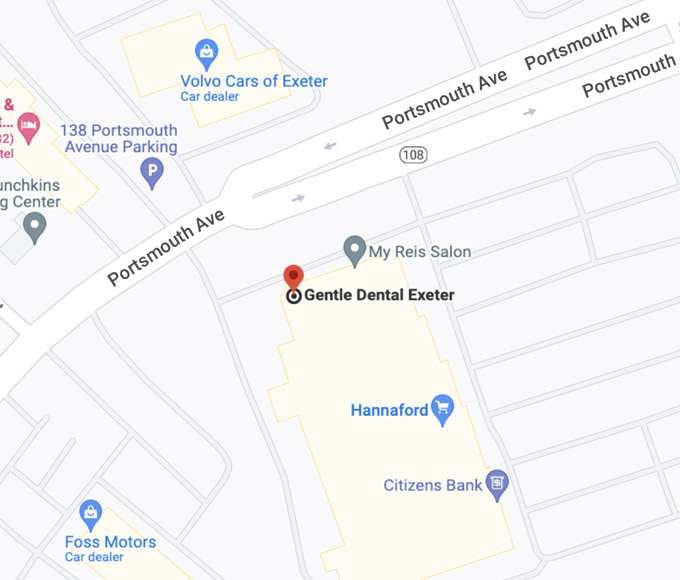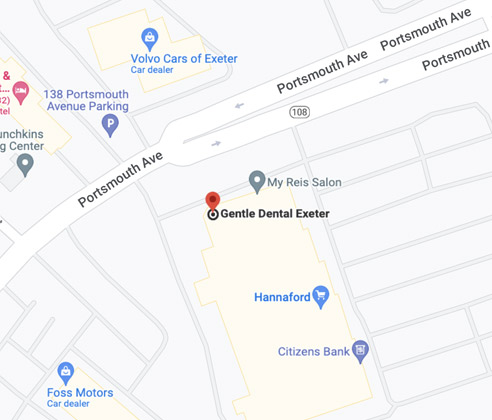- Locations
- Locations
- Arlington
- Attleboro
- Belmont
- Beverly
- Boston
- Braintree
- Brockton
- Brookline
- Burlington
- Cambridge
- Chelmsford
- Concord, NH
- Derry, NH
- East Longmeadow
- Exeter, NH
- Franklin
- Hanover
- Hudson
- Keene, NH
- Malden
- Manchester, NH
- Medford
- Methuen
- Milford
- Nashua, NH
- Natick
- New Bedford
- North Andover
- Norwood
- Peabody
- Quincy
- Raynham
- Rochester, NH
- Saugus
- Seekonk
- Somerville
- Stoughton
- Wakefield
- Waltham
- Worcester
- Dental Services

Orthodontics In Exeter
Transform your smile with expert care from an orthodontist in Exeter at Gentle Dental. We offer personalized treatments to improve alignment and enhance oral health. Schedule your consultation today!
Dental Office Hours
Monday 8:00 AM - 5:00 PM
Tuesday 8:00 AM - 5:00 PM
Wednesday 8:00 AM - 5:00 PM
Thursday 8:00 AM - 5:00 PM
Friday 8:00 AM - 4:00 PM
Saturday CLOSED
Sunday CLOSED
Dental Office Hours
Monday 8:00 AM - 5:00 PM
Tuesday 8:00 AM - 5:00 PM
Wednesday 8:00 AM - 5:00 PM
Thursday 8:00 AM - 5:00 PM
Friday 8:00 AM - 4:00 PM
Saturday CLOSED
Sunday CLOSED
Gentle Dental Exeter Reviews
Absolutely love the office staff and the orthodontist, Dr Konstantinos Megkousidis. He has a wonderful way of talking with people and explained everything to our daughter so she knew exactly what treatment entailed. He is very knowledgeable and we have complete confidence in his recommendations. Very reasonable price for treatment as well.
I come from a family of dentists so I’m naturally very picky about my cleaning and the office I go to. The experience was top notch. Heather, their newer hygienist is fabulous and very friendly. I was very happy
Dental Services In Exeter
In addition to specialized periodontal care, our Exeter office offers a full range of dental services. From routine cleanings to advanced treatments, our experienced periodontist and dedicated dental team are here to address all your oral health needs. Enjoy exceptional, personalized care tailored to you.
Preventive Care
Restorative Care
Crowns and Bridges
Dental Fillings
Extractions
Gum Treatments
Implants
Oral Surgery
Partial and Full Dentures
Root Canals
Wisdom Teeth Extractions
Orthodontics
Additional Services
Understanding Orthodontics: What It Is And How It Works
Orthodontics is a specialized branch of dentistry that focuses on correcting misaligned teeth and malocclusions. Derived from the Greek words "orthos" (straight) and "dontics" (teeth), it involves straightening teeth and addressing irregularities in the teeth, jaws, and face. Specialists in Exeter Orthodontics provide expert care to improve oral health and alignment for a confident smile.
What Are The Responsibilities Of An Orthodontist?
Orthodontists, including specialists, use fixed and removable devices such as braces, retainers, and bands to correct the positioning of teeth. Orthodontic treatment addresses dental issues like:
- Crooked teeth
- Bite problems, including overbites and underbites
- Crowded teeth or excessive spacing
- Jaw misalignment
The primary goal of orthodontic care is to enhance your bite. Properly aligned teeth fit together seamlessly with opposing teeth, ensuring efficient chewing, speaking, and overall oral health. While orthodontics is often associated with children and teenagers needing braces, Exeter orthodontics can address dental problems and improve smiles at any age.
Advantages Of Orthodontic Treatment
Orthodontics offers more than just cosmetic enhancements. Choosing to straighten your teeth with a dentist in Exeter provides several benefits, including:
- Boosted self-esteem
- Improved dental function for better chewing and more explicit speech
- Lower risk of cavities by reducing food buildup between teeth
- Decreased likelihood of gum injury and trauma caused by overbites and misalignments
Goals Of Orthodontic Treatment
Orthodontic care focuses on achieving the following:
- Enhanced cosmetic appearance and improved confidence
- A healthy, functional bite
- Prevention of dental diseases
Common Dental Issues Corrected By Orthodontics
- Crowded Teeth: Misaligned or overcrowded teeth, often caused by a lack of space in the mouth, can lead to improper bites and aesthetic concerns. Upper canines are particularly prone to crowding.
- Open Bite: Occurs when the upper and lower front teeth don't meet, resulting in chewing difficulties.
- Deep Overbite is a misalignment in which lower teeth touch the roof of the mouth, potentially causing gum damage, gum disease, tooth loss, and wear.
- Crossbite: A condition where teeth do not meet adequately, affecting appearance, chewing efficiency, and tooth durability.
- Increased Overjet: Protruding upper teeth, often caused by thumb-sucking or uneven jaw growth, affecting both function and appearance.
- Reverse Overjet: A protruding lower jaw surpasses the upper jaw, leading to worn teeth and cosmetic concerns.
- Spacing Issues are gaps between teeth caused by missing, smaller, or poorly developed teeth, which impact appearance and alignment.
Consult an Exeter dentist to address these issues and achieve a healthier, more confident smile.
Techniques Used By Orthodontic Specialists
Orthodontics can straighten teeth for adults, adolescents, and children using fixed or removable braces. These braces can be adjusted to align teeth effectively while accommodating growth and development.
Why You Should Visit An Orthodontist?
Misalignment, or malocclusion, is a common reason to visit a dentist in Exeter. Often hereditary, it occurs due to size discrepancies between the upper and lower jaw or between the jaw and teeth. This can result in overcrowded teeth, an irregularly shaped jaw, or abnormal bite patterns.
Potential Risks Of Orthodontic Treatment
While orthodontic treatment is generally highly beneficial, there are some risks to consider, though the advantages often outweigh them. These risks include:
- Early Tooth Decay: Inadequate cleaning around braces can lead to plaque buildup, increasing the risk of cavities, particularly with high-sugar diets.
- Root Resorption: Te movement during treatment may sometimes result in root shortening or resorption.
- Gum Support Loss: Braces may contribute to gum inflammation in specific individuals, potentially increasing the risk of gum disease or aggravating existing conditions.
With proper care and guidance from Exeter orthodontics specialists, these risks can be minimized to ensure a successful treatment outcome.
Frequently Asked Questions
Does Orthodontics Focus on Repairing Teeth?
A dentist in Exeter would address issues like a chipped tooth, while an orthodontist primarily focuses on correcting bite alignment and jaw positioning.
How Does a Dentist Differ from an Orthodontist?
An Exeter dentist provides general dental care, but not all dentists are orthodontists. Orthodontists specialize in correcting bite alignment and straightening teeth to improve their fit and function.
Can an Orthodontist Extract Wisdom Teeth?
Wisdom teeth are usually removed by an oral surgeon, not specialist orthodontics.
Do Orthodontists Handle Dental Implants?
Orthodontists typically do not perform implants, as their expertise lies in alignment and bite correction rather than implant placement.
Book an Appointment
If your request is a dental emergency, or you would like to call and schedule your dental appointment, contact information for our offices can be found here: Gentle Dental Locations. New patient offer not valid for emergency appointments.

